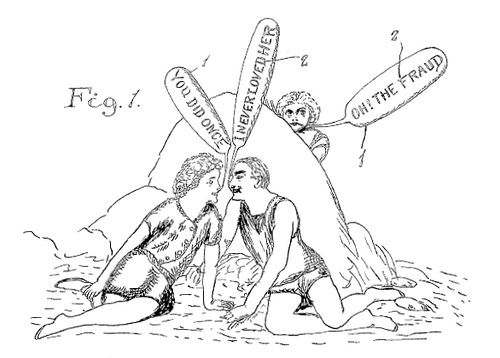Statements of the family and associates of H. Rider Haggard regarding the events of July 9, 1904:
Mrs. M.L. Haggard:
On the night [of] July 9th I was awakened by most distressing sounds proceeding from my husband, resembling the moans of an animal, no distinct words. After listening for a few moments, I woke him up, whereupon he said that he had had a nightmare, in which he was engaged in some struggle connected with our retriever dog “Bob,” and that “Bob” was trying to talk to him and explain that he wanted help. It was quite dark at the time, so I conclude it must have been about 2 a.m.
Angela Rider Haggard:
On Sunday morning, July 10th, my father mentioned at the breakfast table that he had had a horrid nightmare about my black retriever dog “Bob.” He said that he dreamt the dog was dying in a wood and trying to make some communication to him. My mother corroborated this statement, saying he had made such a noise that he had even awakened her, and she aroused him as he seemed so disturbed. Of course we all laughed at it at the time, for we did not know then that anything had happened to the dog, for I had seen him myself at 8 o’clock on the preceding evening.
Lilias R. Haggard:
On the evening of Sunday, July 10th, I, who am in the habit of feeding the dogs, told Daddy that “Bob” had not come to his breakfast or his supper that day, so I thought he must be lost. Daddy had said at breakfast on Sunday that he had dreamt that “Bob” was dying in a wood, and that he, Daddy, was trying to extract something from “Bob,” and that “Bob” was trying to speak.
Harry Alger, railway platelayer:
I was at my business on the line between Bungay and Ditchingham at 7 o’clock on the morning of Monday, the 11th July … and found the broken collar of a dog lying there, which I produce, and had to scrape off the dried blood and some bits of flesh from the line. … Under all the circumstances I think that the dog must have been killed by the late excursion train on Saturday night which left Ditchingham for Harleston at 10.25. … The marks of blood upon the piles showed where the dog had fallen from the bridge into the reeds. These reeds grow in deepish water.
C. Bedingfield, groom:
My master and I found the dog in the Waveney near the Falcon Bridge on the morning of July 14th. It is the retriever dog, Bob, which I have known ever since it has been at Ditchingham House.
“I seem therefore to come to this conclusion,” Haggard wrote later, after relating the story in the Times. “Either the whole thing is a mere coincidence and just means nothing more than indigestion and a nightmare, or it was the spirit of the dog on its passage to its own place or into another form, that moved my spirit, thereby causing this revelation, for it seems to be nothing less.”


